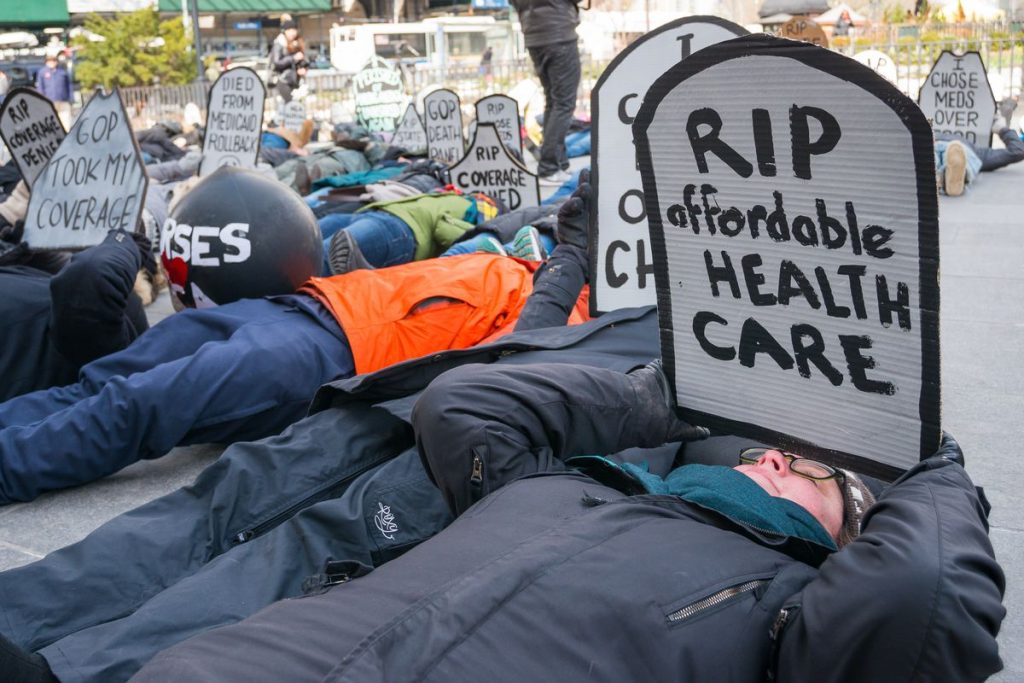
/cdn.vox-cdn.com/uploads/chorus_image/image/55322635/GettyImages_652358058.0.jpg)
The health care industry killed Hillarycare in the 1990s and cut deals to shape Obamacare more to its liking in 2009. But now, as Republicans push a sweeping and widely reviled health bill through Congress, the industry has often appeared declawed in the biggest health care fight of the decade.
It’s a deliberate strategy, interviews with nearly 20 lobbyists and other experts suggest. Health industry groups generally don’t love Obamacare enough to jeopardize their ability to shape the rest of the Republican agenda — including big corporate tax cuts. They also fear incurring White House retaliation.
The Trump administration has already leveled direct threats to cut off federal subsidies to health insurers and to go after the drug industry, and Republicans hold the purse strings for the federal programs that cover many of the patients seen by the nation’s doctors and hospitals.
Further complicating matters, different sectors within the industry have very different stakes in repealing Obamacare and replacing it with the GOP’s plan. Many health insurers are already ambivalent about Obamacare and could see significant tax cuts if the law is rolled back. Doctors and hospitals, on the other hand, could face a surge in uninsured patients if millions fewer Americans have health coverage.
As a result, those groups have not collectively gone all out, on the airwaves or in the halls of Congress, to stop the GOP’s health care bill — even though they have expressed almost unanimous opposition to it.
“It’s not all-out warfare,” said Kim Monk, who tracks the health care debate in Washington for investors at Capital Alpha. “Republicans are going to be around for a while, and they tend to be your allies on really important things.”
The House legislation is projected to lead to 23 million fewer Americans having health insurance in 2026 and include an $830 billion cut to Medicaid, the nation’s largest insurer and a critical safety net for the most vulnerable Americans — and an important source of revenue for hospitals and doctors.
But other looming bills also mean big money for the industry. Republicans want to resolve health care so they can move on to a tax overhaul, expected to include a big corporate tax cut that many health care companies could benefit from. Repealing Obamacare’s taxes on the industry, plus that corporate tax cut, could save health care companies upward of $200 billion over the next decade, by some rough estimates.
There are also more legislative items coming, including federal spending bills and reauthorizations of health programs, for which the industry wants a seat at the table.
“All these groups have things that they want,” Monk said. “They’re all similarly motivated in that it’s not just about the [Affordable Care Act]. They know they have a few years ahead of issues they have to navigate.”
So there are no “Harry and Louise” ads, the TV spots credited with sinking Bill Clinton’s health care plan. “There is a significantly lower level of engagement of the sectors writ large across the board,” one lobbyist, who like most others spoke on the condition of anonymity, said. This lobbyist has worked in Washington for more than 20 years and has seen several high-profile health care fights.
“I’m surprised we haven’t seen some of these larger trade associations and patient groups band together,” this lobbyist said. “Have a dialogue and a conversation about this, really point out the shortcomings of the House bill and whatever emerges from the Senate.”
Contents
- 1 Like everyone else, the health industry is scrambling in the Trump era
- 2 Health care companies have to decide how much they care about Obamacare
- 3 Other fights also mean big money for industry players
- 4 The industry would like to see the bill die, but not take the blame
- 5 Democrats are mad — but that’s less important than Republicans right now
- 6 Maybe the lobbying push isn’t happening in Washington
Like everyone else, the health industry is scrambling in the Trump era
Repealing and replacing Obamacare is a uniquely partisan exercise; Republicans have campaigned on it for seven years. Some health care lobbyists claim that they are therefore somewhat helpless to stop the GOP from pursuing a long-sought goal. (History suggests otherwise.)
The industry started the AHCA debate guardedly, hoping to win some favor with Republicans and earn a seat at the table. Even as the House bill devolved into a plan that they uniformly opposed, they looked ahead to what they hoped would be a more reasonable Senate.
But now reality is setting in that if the Senate does pass a bill, it might not improve much on the House version. And then at that point, the momentum would probably be too strong to stop it. That’s an outcome the health care lobby has resigned itself to in the choices it’s made over the past few months.
Trump’s victory stunned everybody — including the lobbyists who had spent the previous year largely preparing for a Hillary Clinton presidency and the more modest tweaks to Obamacare that would have been expected if she had won.
Health insurers had prepared their case for a Democratic White House: 2018 will be a make-or-break year for Obamacare, they would argue, and these are the changes we need to make the markets viable.
Then Trump won, and all that planning became worthless.
The board of America’s Health Insurance Plans, the leading insurance lobby, met two days after the election. They dusted off their playbook from previous existential threats to Obamacare — like the Supreme Court case that would have invalidated the law’s tax credits in much of the country — but they were starting a step behind.
So was everybody else. The same situation played out again and again at different lobbying firms and trade organizations, based on my conversations over the past six months.
In a way, the entire industry had gotten what it wanted: Republican control of Washington. Health care companies collectively have funneled more money to Republicans than Democrats every cycle since 2010: $37.6 million to Republicans versus $32.6 million to Democrats in 2016, according to Open Secrets. The figures were more lopsided in 2014 and 2012.
So though they hadn’t been expecting a Trump win, insurance companies made a tactical decision after the election to engage with Republicans rather than fight tooth and nail to keep Obamacare. They had been planning anyway to try to push for changes to the insurance market. They decided to work within the system to make the GOP’s product better for themselves, rather than work to obstruct it.
“It was a conscious decision on their part to be an informative player, not step out of the umbrella as an advocate,” said one lobbyist who represents insurers, a sentiment shared by others.
Health care companies have to decide how much they care about Obamacare
The general belief when Obamacare was passed, after most of the industry had endorsed it, had been that more people with health insurance (or more customers, in other words) would be a net benefit for the industry, much of which had been asked to pay taxes or take spending cuts to help fund the law.
Reality has been more complicated. Health plans saw millions of new customers, but the costs of covering those people were higher than they expected, and some insurers have decided to drop out of the law’s marketplaces entirely. Hospitals were hit with funding cuts, which were supposed to be offset by an expansion of Medicaid, but then the Supreme Court and Republican states intervened to prevent every state from extending eligibility for the program.
Drug companies expected a surge of new customers to offset taxes they agreed to pay, but a high-ranking industry official told me late last year that with many customers purchasing plans that still had high out-of-pocket costs, that windfall hadn’t really materialized.
“The coverage sucked,” the official said.
Even within individual industries, there is a significant disparity in how much Obamacare matters to their companies’ bottom line. Among insurers, some are not participating in the Obamacare marketplaces at all; others have made major plays for the law’s new customers.
Other fights also mean big money for industry players
Meanwhile, industry players are also calculating how much exposure they have if they come out hard against the GOP health care bill and Trump decides to retaliate — or what happens if the Republican agenda gets bogged down.
For starters, the House health care bill repeals Obamacare’s various taxes on the industry, totaling nearly $200 billion in tax cuts over 10 years for drug companies, health insurers, and medical device companies.
And what happens if a tax overhaul is scuttled? Some rough back-of-the-napkin math, based on figures from the IRS, suggests the health care industry could see its collective taxes lowered by $2 billion a year if Trump gets his 15 percent corporate tax rate, though there are plenty of caveats until we see a detailed plan. Other parts of a reform plan, such as reducing or eliminating taxes on income earned abroad by American companies, could carry enormous benefits for, say, pharmaceutical companies.
“Pharma is hugely interested in tax reform,” Monk said. “That’s way more impactful to them than whatever happens with AHCA.”
Or what happens in September, when Congress is looking for spending cuts as part of the debt ceiling negotiations — health care is always a good place to find cuts, given that it consumes $1 out of every $4 in the federal budget.
The answer to that calculus has been, by and large, that it’s simply not worth it for the health care industry to go all out to save Obamacare.
“What you’re seeing here is not a lot of people setting themselves on fire,” one Republican health care lobbyist said. “I think you find that a lot of folks think: What is in this that I care so much about that I’m willing to take that risk?”
The industry would like to see the bill die, but not take the blame
They’re playing a dangerous game. The health care industry likely wants the GOP’s health care gambit to fail — deep Medicaid cuts and fewer insured Americans could certainly cut into their business — but they also don’t want their fingerprints on it.
“I think industry is holding back in the Senate out of a belief that this may collapse largely on its own,” another GOP health care lobbyist told me, “and out of concern for how Trump might retaliate if industry is perceived as killing it.”
Trump is already threatening to cut off crucial Obamacare subsidies to insurers, totaling $7 billion a year, despite their pleas for the White House to assure them that the payments would be made. The president has blasted drug companies for “getting away with murder” and sworn to bring down drug prices.
Lobbyists for doctors and hospitals will tell you that their clients are also plenty exposed themselves to retaliation, and there is truth to that: The federal government touches everything related to health care.
But most people believe those sectors, the “white coats” that patients see every day, are more inoculated from direct retribution from the White House. A coalition of health care groups announced last week that they would hold a series of events across the country to highlight their concerns about the GOP’s plan. It was composed of the AARP and disease-focused groups — and the doctor and hospital trade associations.
Democrats are mad — but that’s less important than Republicans right now
Several lobbyists told me they have felt heat from Democrats for their apparent hesitance to oppose the GOP bill too strongly. But they worry more that too much direct defiance could bring Republican backlash — and that they could succeed to shape the Senate bill more to the industry’s liking by working with the GOP.
Several insurance lobbyists told me they had largely found Republicans receptive to their ideas. Republicans are fixated on lowering premiums and sought technical guidance from health insurers on how to do that.
But when insurers signed on to a letter expressing concerns about the House bill’s Medicaid cuts and reduced tax credits for people to buy private insurance, they caught some hell from House staffers, a source familiar with the response told me.
“It’s not like you can walk into a Republican office and say, ‘We want you to be against this thing that you’ve been for for seven years,’” a lobbyist for hospitals said.
Maybe the lobbying push isn’t happening in Washington
A few lobbyists object to the idea that the health care industry isn’t doing all it can on the AHCA. They say that the work that is underway is happening far away from the nation’s capital, which is why it might feel invisible to the DC media — and to lawmakers.
“I think they’re doing stuff outside of DC. I don’t think they’re focusing on DC,” a Republican health care lobbyist told me.
This is where the challenges of the new media environment present themselves. The “Harry and Louise” ads in the 1990s are believed to have had their impact because they were seen by members of Congress, not because they rallied grassroots opposition.
This year, the industry seems to have flipped that script. They are banking on opposition in the states, stirred up through more targeted digital and television ads, to stop the bill. The events being organized by AARP, disease groups, and the doctor and hospital trade associations will be out in the rest of the country, not in Washington.
That’s in part a bet on effectiveness. The thinking is that Republicans in Washington, so set on rolling back Obamacare, will only reverse themselves if they feel relentless pressure from their constituents.
“At the end of the day, [West Virginia Sen. Shelley Moore] Capito is going to be for this bill or against this bill based on where her constituents are,” the longtime lobbyist told me, referencing one of the crucial swing votes on the bill in the Senate.
But the other benefit is that the strategy feels less confrontational for an industry that usually aligns with Republicans anyway.
“You have to recognize that elections matter. They decided this is what they’re gonna do,” one of the hospitals lobbyists said. “At some point, it may be that you’re fighting a losing battle. There is only so much you can do.”
There are still ample doubts that Senate Republicans, working with a thin margin for error, can coalesce around a plan and pass it. If that is what happens, the industry’s decision to lie relatively low and not enrage Trump could prove to have been a smart bet.
As one of the hospitals lobbyists told me, “Why upset the Washington establishment when you don’t have to?”
[“Source-ndtv”]




